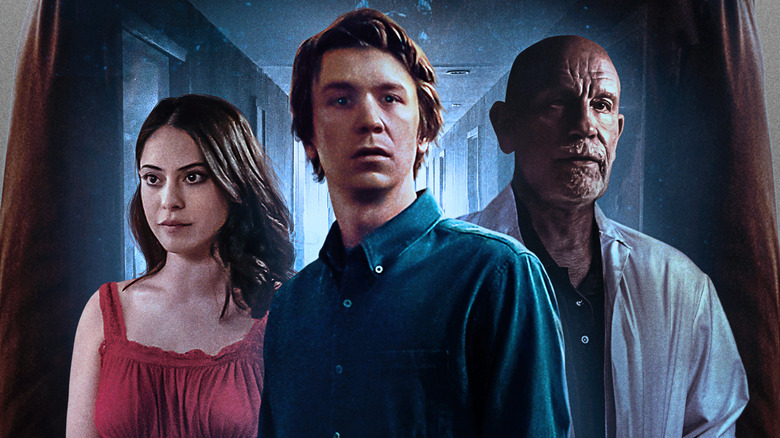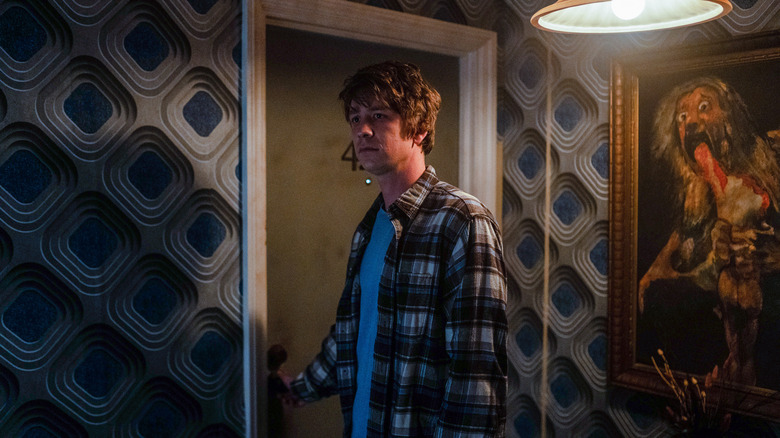Chariot Review: This Muddled, Messy Sci-Fi Shows Promise, Then Loses Grip
One of the core tenets of good sci-fi is crafting a believable world, one that's easy to get lost in — but also one just as easy to navigate down the rabbit hole at the same time. Coherency is just as important as world-building. In fact, a good sci-fi story hinges on the collaboration of both. Writer-director Adam Sigel's film "Chariot" gives the beginnings of this partnership, but despite opening and closing sequences that serve as compelling bookends framing the context of a promising sci-fi world, it's everything in between that is complicated and messy — essentially negating, or at least severely diminishing, the potential the film established through its first scene and reestablishes in its finale.
"Chariot" follows the story of Harrison (Thomas Mann), a young man who has been suffering from a puzzling recurring dream throughout much of his life. He turns to Dr. Karn (John Malkovitch) for help and, in doing so, inadvertently alerts the psychologist to a glitch in the system of reincarnation through a recent encounter with a woman Harrison loved in a previous life. Through Karn's work, he makes it a point to try to rectify the glitch and, in turn, his patient's fate.
The opening scene of the film gives us a glimpse of Harrison's past life, and it uses very little dialogue to draw us into the story. In turn, we get this moody and brooding introduction that really sets the scene. In fact, it sort of spoils the audience, because we assume we're going to get this type of meticulous, mysterious storytelling throughout the film. However, the execution of the story and even the plot itself started to fizzle out fairly quickly after the gripping opening sequence due to a lack of, well, much of anything actually going on. What does go on in the film is more Lynchian than you'd expect, both in the script and performances, but it's uninspired and doesn't have much direction due to a flat script that doesn't reveal what needs to be revealed at the right times to keep an audience engaged. Naturally, that flaw doesn't do "Chariot" any favors.
Despite the movie's messy middle, there are some interesting performances to keep you at least somewhat intrigued. John Malkovitch is better used than he's been lately, despite a puzzling and somewhat distracting hair choice that doesn't do much for the character. He's doing more here, putting in more efforts to build character — for example, the subtle change in his voice is a small yet effective touch — than I've seen him do in a while, and his particular brand of eccentric intelligence is well placed within this story. Ultimately, he's not overused, and the character ends up being the most memorable in a crew of weirdos. However, it isn't enough to hold our interest. In fact, by the time Malkovitch's Karn becomes more important in the final act, you're already too tired of the whole film to care about the reveals he makes to Mann's Harrison about himself. In a better-structured film, that probably wouldn't have been an issue.
How to mess up a sci-fi
Leading man Thomas Mann's performance is another one of note, as he shines alongside strong characters. Harrison is a pretty level-headed, normal guy with a shy streak, yet a willingness to learn — which is an incredible backdrop on which to place a cast of quirky characters. The film has those in spades, but while those performances tend to come off slightly contrived, they aid in the sincerity of Mann's turn as Harrison. Despite their brash awkwardnesses and unabashed boldness, these characters pale in comparison to Mann's quiet contemplativeness. He — this incredibly basic man — is easily the most human character in the movie, which says a lot about what the movie wants to be and what it's lacking.
"Chariot" is overarchingly about love, that much is obvious, but its exact message is muddled by its delivery. It certainly wants to have something grand to say about the longevity of love, theoretically transcending lifetimes, but the movie's careless execution — which already hinders the watchability from the standpoint of keeping folks interested — completely squashes its ability to say anything new or profound on the subject. Instead, it relies on the surface-level quirks of its characters to attempt to convey a similar message. But those idiosyncrasies don't succeed in pulling the film as a whole from the mundane, the muddled, or the confusing, so how could they do anything to breathe new life into the movie's themes about love?
Ultimately, writer-director Sigal's issue lies within his script more so than his directorial eye. Similar to the opening scene, the film's finale is also well done, bringing us intrigue and stakes in a way the movie seemed to want to in the beginning but forgot about somewhere en route to the end. The bookends Sigal gives us with his opening and closing scenes certainly hint at a bigger, more ambitious — and, truthfully, better-shaped — story capable of bold visuals and storytelling that gives the audience something to follow into the next moment. It's just a shame all of the meat of this film fell victim to the problems of a bewilderingly ineffective script.
/Film Rating: 4 out of 10
"Chariot" is now in theaters, On Demand, and digital.

